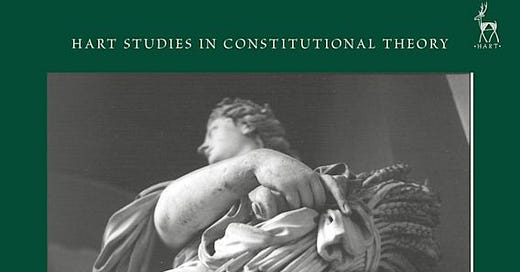Last week the University of Glasgow hosted the launch of my recent monograph, Equality Before the Law: Equal Dignity, Wrongful Discrimination, and the Rule of Law. This book is based on my PhD thesis which won the Yorke Prize from the University of Cambridge.
The event was a day-long inquisition of each chapter in the book by a collection of excellent scholars. It represented, for me, the peak of academic excellence: rigorous, unapologetic engagement with contested ideas that remained cordial and respectful. Several friends of The New Digest contributed, providing a welcome classical flavour to the event.
To follow up on this, The New Digest will host a condensed version of that launch over the next few weeks. We will start with this post, which sets out the central theme of the book, followed by posts engaging with specific chapters therein, concluding with a response from me. Particular attention will be paid to the aspects of the book which draw upon the classical legal tradition.
The focus of this book is on the value of equality, specifically on how this value manifests within the common law. It argues that there is a distinct principle of equality before the law which is tied intimately to the rule of law and the intelligibility of legal reasoning. This principle can be separated from more abstract or speculative ideas of equality which focus on distributive or identity-based justice. Rather, it is a substantive constitutional principle that demands public authority, if it is to remain legitimate, must respect the equal moral status of all legal subjects.
The first major question that the book addresses then is how to deal with disagreement over what it means to treat people as moral equals. There are many ways that a commitment to moral equality could manifest. Indeed, practically all modern political theories presume, even if they don’t explicitly invoke, the moral equality of persons. But there is something distinctly legal about a principle of legal equality. Appeals to abstract or speculative political theory will result in an impoverished account. Just as the common good is best understood to be a legal concept, so too must we conceive of legal equality by reference to the principles and doctrines which can be found within our own legal tradition, including within the structure of juridicial relationship and legal reasoning itself.
In the second half of the book, these general theoretical claims are applied to two distinct constitutional principles: protection from wrongful discrimination and the requirement on public officials to pursue the common good. It is this latter principle which forms the focus of this symposium.
In brief, the book argues that proper respect for the moral equality of persons demands recognition that law is a public asset which must be directed towards advancing the interests of those it governs. In a juridical context, this principle helps set the outermost limits of public authority, ensuring that political discretion is afforded due respect while maintaining the character of a legal order as one that is genuinely directed towards a plausible conception of the common good. To do this, political authority and judicial reasoning must look beyond individual rights claims, as important as respect for fundamental rights is. Legal equality manifests a foundational commitment to the collective flourishing of all legal subjects; legal officials charged with maintaining constitutional order must take that seriously, understanding that the pursuit of the common good is central to their own success as custodians for each and every person under their charge.




